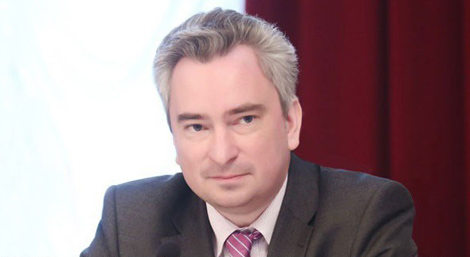Opinions & Interviews
Economic benefits of IT country policy in Belarus pointed out

Vsevolod Yanchevsky. An archive photo
MINSK, 12 April (BelTA) – The government policy aimed at building an IT country generates economic benefits for Belarus. Director of the Hi-Tech Park Administration Vsevolod Yanchevsky made the statement during the meeting of Belarus President Aleksandr Lukashenko with representatives of the country’s IT community on 12 April, BelTA has learned.
According to Vsevolod Yanchevsky, prior to 2017 the Hi-Tech Park’s export did not grow steadily. It even dropped gradually. The trend was reversed unexpectedly later: in 2017 the Hi-Tech Park’s export grew by 25% to reach $1 billion. Vsevolod Yanchevsky remarked that nothing radically changed on the domestic market and foreign ones, however, Belarus’ IT sector started noticeably growing.
Vsevolod Yanchevsky said: “You met with representatives of one of our prominent IT companies in early 2017. Many matters were discussed and you announced the policy of building an IT country. 2017 was the year of work on the [Digital Economy Development] Ordinance. It is remarkable that it wasn’t signed yet, but it was already producing a very good effect.”
The director of the Hi-Tech Park Administration remarked that investors and businessmen saw the government’s attitude to the development of the IT sector back then and became more active, started coming to Belarus. “Even when discussion was in progress, when these statements were made and initiatives were put forward, our life was invigorated, it produced a direct economic effect,” Vsevolod Yanchevsky stressed. “Customers saw that the country treats the IT sector well, that the IT sector develops, there are good plans, the state of affairs is already good and they want to make it even better tomorrow, which means it is a stable country, one should place bigger and more expensive orders.”
In 2018 the total revenues of the companies residing in the Hi-Tech Park reached Br3.2 billion, nearly 50% up from 2017. Their products and services are exported to 127 countries. The top ones are the USA and the European Union. “Let me repeat it once again: nothing objective changed in 2017-2018 – the markets or the people. Everything was the way it had been before that. Except one thing: the IT sector got a second wind somewhere. And it was reflected in figures and results,” said the head of the Hi-Tech Park.
Vsevolod Yanchevsky pointed out that the Hi-Tech Park is also represented in other regions of the country. There are offices in all the oblast capitals as well as Bobruisk, Soligorsk, and Novopolotsk. As many as 30 new residents in the regions were registered last year. “We see a powerful growth trend. I think more and more companies are going to be created in the regions,” Vsevolod Yanchevsky is convinced. “Some of them don’t want to leave their home towns never mind leaving the country.”
In his opinion, the volume of export is less important than the creation of jobs by the Hi-Tech Park resident companies. One can say that brain drain has been plugged. “There are jobs for everyone. Everyone finds employment to their liking. Some get a job while they are still in university. The Hi-Tech Park takes absolutely all the graduates and wants more,” noted the director of the Hi-Tech Park Administration. “Moreover, people are relocating from other countries. The Belarusians, who once left the country and worked in major companies, even the very top ones, are coming back.”
In 2018 companies residing in Belarus’ Hi-Tech Park employed over 45,700 people. In 2017-2018 alone they hired over 18,000 people. The average salary in the Hi-Tech Park stands at Br4,400. “A Hi-Tech Park employee pays 3-3.5 times more in income tax than the average Belarusian,” Vsevolod Yanchevsky pointed out.







 print version
print version make home page
make home page add to bookmarks
add to bookmarks

